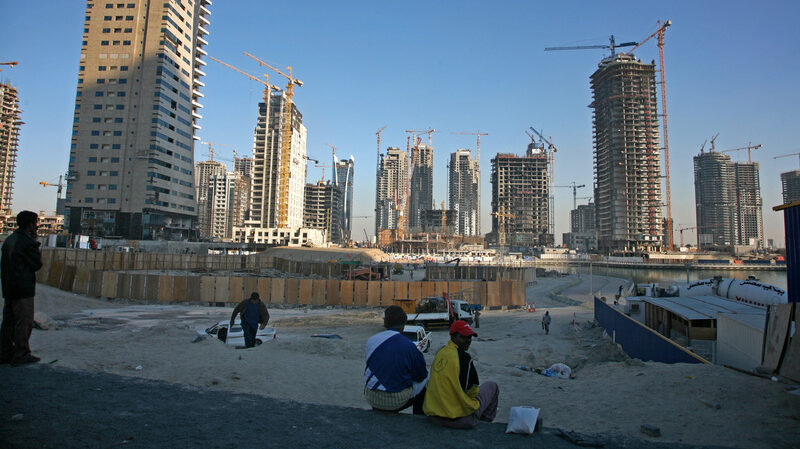In a recent address to global climate envoys, the Emirati President of Cop28 Sultan Al Jaber proclaimed that the United Arab Emirates had “embraced the energy transition.”
The speech was the fore-runner to the start of a typically slick public relations campaign, with the UAE’s Minister of Climate Change Mariam Almheiri telling Reuters that the world is not ready to “switch off” fossil fuels.
If there are any within the climate movement holding out hopes for the UAE’s approach to climate change, this is the moment to start paying attention to its record as a profoundly regressive and dangerous actor in global affairs.
The reality – not always immediately obvious to those engaging with the UAE for the first time – is that it is a borderline totalitarian state whose power and influence is rooted in the extraction of fossil fuels.
A little over a decade ago, the UAE launched an aggressive campaign to quash domestic dissent while it funded and supported counter-revolutions across the Middle East in the aftermath of the Arab Spring.
I was one of many many human rights researchers blacklisted from the country, and we watched in dismay as the UAE’s sleek public relations, disinformation and robust diplomacy cowed the international community into meek submission, leaving it free to export its ruinous model of ‘authoritarian stability’.
This week, the UAE made headlines by inviting the murderous Bashar al-Assad to Cop28, a welcome embrace for the Syrian regime that Abu Dhabi has been moving closer to for some years.
The UAE will be as fierce in its opposition to climate justice as it has been in its opposition to the most basic human rights. We are already seeing how they will deploy the same tactics to scupper it.
Take Al Jaber’s claim that the UAE has embraced the energy transition. That’s simply not true. The UAE has spectacular plans for oil and gas production expansion, the third worst in the world according to Rystad Energy data.
The Climate Action Tracker rates the UAE’s climate pledges as “highly insufficient”, its second worst ranking. Per person CO2 emissions in the UAE are higher than almost anywhere else in the world.
Al Jaber is CEO of Adnoc, the state oil producer. Hugely expensive, flawed eco-city projects like Masdar City cannot hide these realities, but you can be sure that the UAE’s vastly-resourced public relations machine will do its best to cover them up.
The power the ruling Al Nahyan family wields is rooted in their complete control over the country’s oil and gas reserves. As Jim Krane describes in Energy Kingdoms, “ruling families [in the Gulf] used their expropriation of the global oil business to fortify control … these countries became more autocratic as they developed, not less.”
World Bank body delays vote on controversial loan to Brazilian dairy firm
Nowhere is this more true than the UAE, which has forcibly disappeared, locked up, exiled, or bullied into silence any Emirati who has offered even mild criticism of the state. Since the arrest of Ahmed Mansoor in 2017, not a single independent human rights activist has been able to operate in the UAE, which operates a terrifyingly effective surveillance state.
In 2018, visiting academic Matthew Hedges was seized by security forces, force-fed a cocktail of drugs and coerced into falsely confessing to being a British spy: he was sentenced to life in prison before international outrage finally ended his six month ordeal.
This level of domestic control could not be achieved without oil and gas exports, which account for around 90% of UAE government revenue, ensuring the fealty of elites and staving off the threat of dissent from below.
It also enables the UAE to export its model of ‘authoritarian stability’, backing autocrats and anti-democrats around the world, from Libyan warlords to the Egyptian military regime, to name two of the most obvious examples. The Al Nahyans lean close in to Vladimir Putin, selling him microchips that are vital to sustain his invasion of Ukraine and buying his crude oil at knockdown prices.
With so much vested in oil and gas, it is easy to understand why the UAE is aggressively pushing back against the phasing out of fossil fuels. I was at Cop27 and was struck by the similarity between the UAE’s language and that deployed by close partner Saudi Arabia last year when they led the pushback to including language on fossil fuels, telling the plenary that the conference “needs to address emissions and not the origins of the emissions”.
And because any firm commitment to the phasing out of fossil fuels will undermine its power base, the UAE is more than prepared to bet the future of the planet on unproven and hard to scale carbon capture technologies. Cop28 has been dubbed “a momentous one” by the UN climate chief. The stakes are too high to allow the UAE to bend it to its will.
James Lynch is co-director of Fair Square, a human rights organisation with a focus on authoritarianism
